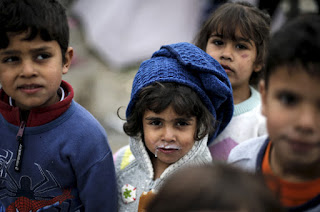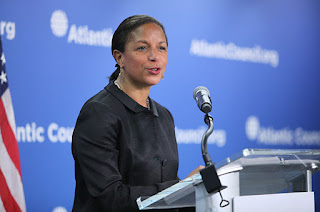Rula Ghani: Afghanistan’s First Lady. Myth Buster. Afghanistan’s First Lady, Rula Ghani, delivered a spirited defense of her husband’s administration on March 31 and warned that “repeated half truths take a life of their own…and suddenly become conventional wisdom.” Speaking at the Atlantic Council, Ghani described and disputed numerous “myths” about Afghanistan that she said exist in the West, particularly in the Western media.
Posts
Showing posts from March, 2016
- Get link
- X
- Other Apps
Poland’s President Seeks Stronger NATO Presence in Europe’s East Poland’s President, Andrzej Duda, wants an enhanced NATO presence—in the form of troops as well as infrastructure—in Central and Eastern Europe to deter Russian aggression, but said his government does not want to isolate Russia or return to the Cold War.
- Get link
- X
- Other Apps
Georgia’s President Wants Security Guarantees for Eastern Partnership Countries The terrorist attacks on Paris and Brussels show that there is an urgent need for “bigger security guarantees” for countries of the Eastern Partnership, Georgia’s President, Giorgi Margvelashvili, said at the Atlantic Council on March 30.
- Get link
- X
- Other Apps
South Sudan: ‘A Problem Child’ Years of conflict, a dysfunctional government, and the international community’s failure to impose tough and meaningful sanctions have contributed to the crippling food insecurity that has caused tens of thousands of people to flee South Sudan, according to the Atlantic Council’s J. Peter Pham.
- Get link
- X
- Other Apps
Belgium Seeks More Action on Intelligence Shared Among European Nations European nations need to do a better job of working together to detect, share, and act on intelligence related to terrorist plots, according to Johan Verbeke, Belgium’s Ambassador to the United States. “There is information that we share with others, but we know it is not being used,” Verbeke said in an interview. “That is a weak spot for some.”
- Get link
- X
- Other Apps
‘We Reap What We Sow’ European governments, and in particular Belgium, are paying a heavy price for having neglected terrorist sleeper cells that have been forming for well more than a decade in their growing, poorly integrated immigrant communities, said Frederick Kempe, President and CEO of the Atlantic Council.
- Get link
- X
- Other Apps
On Brussels Bombings: ‘The Moment Has Come When We Need to Act,’ says Kosovo’s President Atifete Jahjaga Kosovo’s President, Atifete Jahjaga, has called on governments in countries facing the threat of Islamic terrorism to set aside political differences and ramp up intelligence sharing and cooperation with their neighbors. “The moment has come when we need to act,” Jahjaga said in an interview on March 23.
- Get link
- X
- Other Apps
Brussels Bombings Reflect ISIS’ Growing ‘Attack Capability’ The bombings in Brussels on March 22 are a reflection of the Islamic State of Iraq and al-Sham’s growing “attack capability” in Europe, according to Michael Morell, a former Deputy Director of the Central Intelligence Agency who serves on the Atlantic Council's board of directors.
- Get link
- X
- Other Apps
Paris Suspect’s Arrest Likely Hastened Attack in Brussels, says former CIA Director Michael Hayden Salah Abdeslam’s arrest last week in connection with the Paris attacks likely sped up terrorists’ plans to strike Brussels, according to Michael Hayden, former Director of the Central Intelligence Agency and an Atlantic Council board member.
- Get link
- X
- Other Apps
ISIS Strikes Brussels: Is This The ‘New Normal’? The terrorist attacks in Brussels represent a collective failure of Western intelligence, underscore the challenges radicalized young Muslims pose to Europe and the United States, but most of all are emblematic of what the Atlantic Council’s Barry Pavel describes as a “new normal.” The Islamic State of Iraq and al-Sham (ISIS) claimed responsibility for the March 22 attacks—at Brussels’ main international airport and a subway station near the European Union’s headquarters—that left at least thirty-six people dead.
- Get link
- X
- Other Apps
Can Japan Help End the War in Syria? Japan can use its good relationships with various actors in the Syrian civil war to help end the conflict that this month entered its sixth year, according to Kota Suechika , a professor at the College of International Relations at Ritsumeikan University in Kyoto, Japan.
- Get link
- X
- Other Apps

Migrant Deal ‘Reengages’ Turkey with the European Union The deal reached on March 18 to address Europe’s migrant crisis “reengages” Turkey with the European Union, but is a “questionable deal” for Europe, said the Atlantic Council’s Fran Burwell. Refugee children are seen at a makeshift camp at the Greek-Macedonian border near the village of Idomeni, Greece, on March 17. (Reuters/Alkis Konstantinidis)
- Get link
- X
- Other Apps

Human Rights, Democratic Reform at the Top of Obama’s Agenda in Cuba, says Susan Rice Human rights and democratic reform will be at the top of US President Barack Obama’s agenda when he visits Cuba next week and meets with Cuban President Raúl Castro as well as civil society leaders of his choosing, and not those handpicked by Havana, according to US National Security Advisor Susan Rice. “Our unwavering commitment to democracy and human rights will be plain,” Rice said. “The message President Obama will deliver, privately and publicly, is simple: We believe the Cuban people, like people everywhere, are best served by genuine democracy when they are free to choose their leaders, express their ideas, and practice their faith,” US National Security Advisor Susan Rice said at the Atlantic Council on March 17. (Atlantic Council/Victoria Langton)
- Get link
- X
- Other Apps
Is Dissent Brewing in ISIS’ Ranks Over Plans to Strike the United States, Europe? A shift from the Islamic State of Iraq and al-Sham’s goals of building a caliphate to attacking Europe and the United States is reportedly causing a rift in the terrorist group’s upper echelons. A lieutenant to ISIS’ self-proclaimed caliph, Abu Bakr al-Baghdadi, told Martin Chulov, a reporter with the Guardian , that he and at least half a dozen others in the group’s military leadership council don’t believe ISIS can benefit from this shift in strategy.
- Get link
- X
- Other Apps
Low Oil Prices: Good News at the Pump, Bad News for the Environment? Low oil prices not only threaten stability in oil-producing states, they can also diminish efforts to develop and embrace clean energy, according to Ken Koyama , Chief Economist and Managing Director at the Institute of Energy Economics, Japan.
- Get link
- X
- Other Apps
With the Middle East in Turmoil, Japan Looks to Diversify its Energy Options Spurred into action by the instability in the Middle East—its predominant source of crude oil—Japan is actively looking outside the region to diversify its energy options and enhance its own renewable energy production capabilities.
- Get link
- X
- Other Apps
In Somalia, al Shabaab Far from a Spent Force A US airstrike that killed more than 150 al Shabaab fighters at a training camp in Somalia over the weekend emphasizes the extent of the terrorist threat in a country that US President Barack Obama once cited as a counterterrorism success story, said the Atlantic Council’s J. Peter Pham.
- Get link
- X
- Other Apps
Absence of a Plan B Will Give Brazil’s President Rousseff a Lifeline The brief detention of former Brazilian President Luiz Inacio Lula da Silva in connection with a federal investigation of a bribery and money laundering scheme turns up the heat on his successor, but it is unlikely that Dilma Rousseff will be impeached in the short term for one simple reason: Brazil has no Plan B.
- Get link
- X
- Other Apps
‘Not the Time for Divisions in Europe’ The last thing that Europe needs as it grapples with challenges on its eastern and southern flanks is for the United Kingdom to walk out of the European Union, said José Manuel Barroso, a former President of the European Commission. “The multiple crises Europe is facing right now make the case for more European integration,” said Barroso. “It is certainly not the time for divisions in Europe.”
- Get link
- X
- Other Apps
Trump: Rallying around an ‘instrument of class vengeance’ US Senator Lindsey Graham has labelled him a “nut job.” Former Governors Jeb Bush of Florida, Rick Perry of Texas, and Bobby Jindal of Louisiana have described him as a “jerk, loser, liar, and whiner”; a “cancer on conservatism”; and “a shallow, unserious, substance-free, narcissistic egomaniac,” respectively. But these Republican leaders’ opinions appear not to be shared by a majority of the people who count at the ballot box: the American voter. And so it is that Donald J. Trump, a boorish billionaire and political neophyte, has been propelled to the front of the pack of Republican candidates hoping to be the next occupant of the White House.